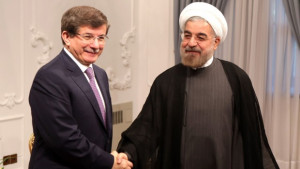
It is in this context of multiple failures that we must read Turkey’s ‘positive’ diplomatic overtures to Iran. As such, following the recent consultations between the two foreign ministries in Ankara, Turkey and Iran have decided to reset their bilateral ties. Iran is confident that Turkey has lost the war in Syria and a new phase in Ankara’s policies is about to begin. Some recent developments on the war-front indicate this failure clearly. In addition to it, Turkey is a well-established market that the Iranian economy can earn substantial money from. Hence, Iran’s emphasis on bolstering economic ties.
However, for Turkey, not only can Iran be a source of supply of oil and gas but also be used to settle the Kurdish question in favour of Turkey. Apart from it, Turkish business elite sees in Iran, just like the European entrepreneurs, a big market to invest in. For Turkey Iranian market has an additional element of significance: assess to it can allow Turkey to make amends for the losses it has suffered and continues to suffer due to strained relations with Russia.
Considering the potential benefits, it was but natural to see Turkey making a drastic change in its erstwhile position on Syria. Instead of paving the way for a ground invasion of Syria, Turkey is now explicitly favouring a sort of ‘political settlement’ of the crisis. The change clearly reflected during Turkish Prime Minister’s most recent visit to Iran. After returning to Ankara, Davutoglu made a startling remark that Turkey and Iran have reached an agreement on the settlement of the Syrian issue. He said, “We don’t want Syria to be divided into smaller states and we reached an agreement with the Iranian officials that this disintegration won’t happen and that Syria would continue its life and presence as a powerful country.”
This freshly designed Turkish position on Syria is something Iran has been advocating not only with regard to Syria but also Iraq and Kurds. During his visit to Turkey in the month of February, the Iranian diplomat thus stated Iran’s position vis-à-vis the wider regional problem, “Kurds are our historical friends. And we want them to continue their existence in prosperity and happiness within the states they live in. Our region is not strong enough to bear new crises. We hope Kurds in other countries will enjoy full citizenship rights as Kurds in Iran do. And if we defend the territorial integrity of Turkey and Iran, we do the same for Iraq and Syria as well.”
On the surface, Iran’s position is favourable to Turkish interests. Clearly, Iran is far from supporting an ‘independent’ Kurdish state in the Middle East. And, this is precisely what Turkey has been resisting through years.
The Iranian official unambiguously underscored that Iran and Turkey are on the same page on the Kurdish question and Ankara can count on Tehran to do all that is necessary to prevent the emergence of an ‘independent Kurdistan’ anywhere on the region’s map – be it inside or outside Turkey or along Turkey’s borders or in its neighborhood. Iran understands that a Kurdish state would certainly stir its own Kurdish population, leading to the emergence of an un-necessary political nuance at home. Hence, Iran’s advocacy of granting ‘citizenship rights’ to Kurds where ever they happen to have presence in the region.
However, despite the apparent Turkish-Iranian rapprochement over the Syrian and Kurdish question, differences continue to exist at some level. This is due to the fact that Iranian-Turkish rapprochement is not so strong as it looks on paper. The current gestures can be explained as both countries’ assessments about the potential benefits they can have by revamping their relations.
These differences were quite explicit even during the recent bi-lateral visits of Turkish and Iranian officials. For instance, No sooner did Davutoglu leave Iran for home than Deputy Foreign Minister Hossein Amir Abdollahian (who is Iran’s point person on the conflict in Syria) briefed the Majlis’ National Security and Foreign Policy Commission that Turkey’s Syria policies have failed, but Ankara is still pressing ahead with policies aimed at the overthrow of the Syrian President Bashar Al-Assad and supported by Saudi Arabia, Qatar and the US.
The Iranian officials did not shy of mentioning to the Turkish officials their disagreement with the way some regional countries, especially Saudi Arabia, continue to back proxy groups to create tension in the region. Similarly, Iran’s official media also continued to reinstate Turkey’s role in creating the same geo-political tensions.
These differences notwithstanding, Iran still understands that it has more shared interests with Turkey than it could possibly have with any other regional power, especially Saudi Arabia and its Gulf allies. The convergence of interests is, however, primarily in the economic domain as both need each other for different reasons. Geo-political tension amid the struggle for regional supremacy continues to exist between them, although both countries seem willing to put it on the backburner for some time at least.
Therefore, with an eye on the future, Iran visualizes that an extension of the gas pipeline connecting Turkey to Europe might be a feasible option to promote its gas exports to a lucrative market. On the other hand, such supply of energy resources from Iran would certainly help Turkey reduce its heavy dependence of Russia. As such, while geo-economics does seem to be making sense to both the countries, geo-strategy continues to cast dark shadows on the prospects of translating this prospective economic relation into a well-shaped strategic alliance.
Salman Rafi Sheikh, research-analyst of International Relations and Pakistan’s foreign and domestic affairs, exclusively for the online magazine “New Eastern Outlook”.
